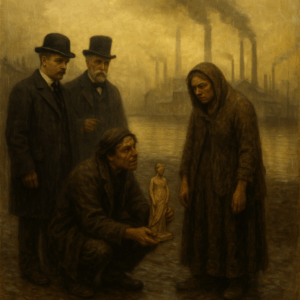And, like a yellow silken scarf, the thick fog hangs along the quay.
— Oscar Wilde, Symphony in Yellow
A rainy day: do you know what that feels like in a town of iron-works? The drops can barely penetrate the dirty fog; its thick, nasty breath down one’s neck. Smoke burns the eyes, while the yellow river coils around the city’s throat like a noose. A reality of soul-starvation, of living death. In this place, borne in hell, time stopped at its inception and obliterated the existence of these people here. I have heard you call our American system a ladder which any man can scale. In this place, it feels more like a bottomless pit, where every attempt to rise ends in a fatal fall.
I stood next to the overseer, Clarke, one of the mill-owners named Kirby, and a doctor called May. Together, we looked upon a man and a woman. Well, Kirby and Clarke scuffed, the rest of us observed. Later, I would learn the names of these hideous animals; Hugh Wolfe and his cousin Deborah. He was feeble, dumb and one could snap him apart like a twig. She was pale, massive in proportion without a single line of beauty about her. Both, clearly, God’s most hated creatures. And yet, seeing them mingle in the dirt, shouting at each other to be heard over the deep clamor of the mills, stirred something in me.
Barely removed from the University of Virginia with a degree in psychology, I found myself ordered here by Mitchell, a patron of the highest order, a man who sucked the essence out of science and philosophy in the utmost gentlemanly way. It was that benevolent man who wanted my personal opinion on the welfare of his creatures. Gladly, I had accepted. My head full of idealism, theories, and romantic notions of understanding the human mind, I had expected to find stoic workers bearing their suffering nobly. I had hoped to find interesting minds – eccentric behavior, melancholia, or other meaningful insights born from struggle. All of that came crashing down on me when I bent down to look into the red rabbit-eyes of Wolfe. His soul had fainted, his nature barely strong enough for a mad cry of rage against the injustice that called itself life. I was startled when his hunchback addressed me with:
“Ma’am, d’ye wan’ t’see th’ thing Hugh’s been makin’? ‘S real fine, it is.”
My eyes wandered upon what could be described as the statue of a woman. It was jagged and unrefined, yet held grace. I could hear the doctor talk to Wolfe:
“What do you mean by this piece of art?”
“She be hungry.”
While the men made sneering comments upon the poor execution, I saw it in Wolfe’s eyes as much as in Deborah’s effort to point out the figure. It had been their attempt at crawling out of this death trap – as hopeless a try as the actual reality of my academic illusions to possess the power for change: all of us doomed to crumble under the weight of disillusionment.

